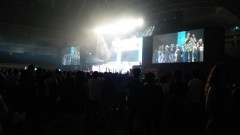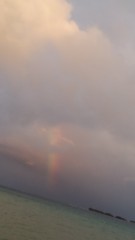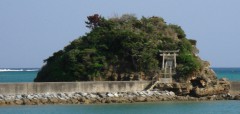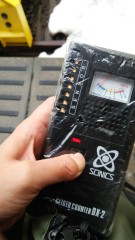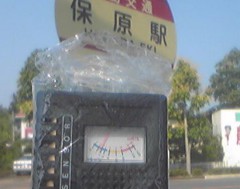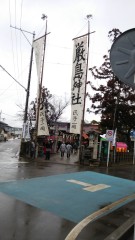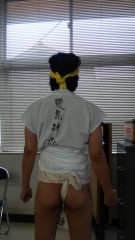29 September 2014
Why is she popular?
I could never understand why a girl like her has become so popular internationally.
Her name is Kyary Pamyu Pamyu.
She is like Lady Gaga of Japan. Her sales points are very unique custumes.
But her singing is not music, just high tone voices.
Last Sunday I went to Tokyo Metropolitan Gymnasium. There was a festival of concerts, fashion shows and exhibitions. Those were awesome but the biggest event was her concert in the final session.
What surprised me was there were many audience from abroad including Europeans. Some wore custumes like she wore.
Can they understand and enjoy her singing?
It seems they did.
I can never follow what they are doing.
What is going on in this world? I felt like Alice in the wonderland.
23:05 Posted in Art, Culture, Japan News, Music, Society, Tokyo Life | Permalink | Comments (0) | Tags: music
31 July 2014
Puff the magic dragon, lived by the sea, in the land called "HENOKO"
I saw the dragon there, in Henoko, Okinawa prefecture, southernmost chain of the islands in Japan.
You might not believe that. This is the proof.
Yes, it looked like rainbow. But the sea is known to be sacred place for the dragon. The locals worship it and established a shrine on the sea coast.
Recently the dragon seems not very comfortable living there because of construction project going on his or her place. On the sea coast is US Marine training camp base, Camp Schwab. There is a plan to expand the base by reclaiming the sea where he/she lives.
The locals oppose the plan because their environment would be deteriorated as well. However, US military and the Japanese government never mind local resisitance movement.
Will he/she leave as the things are? I doubt it.
The sea reminds me of what I experienced 3 years ago in Kaminoseki, Yamaguchi prefecture in the mainland of Japan. Actually I learnt about that town when I joined environment activists meeting in Henoko. I met Kaminoseki activists who protest the construction project that reclaims the sea to build nuclear power plants there. They did the same things as locals in Henoko do, kayaking the sea to prevent construction work from proceeding.
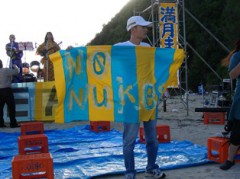
So I visited Kaminoseki later. There I saw the same scene.
Activists on the beach calling for the halt of the project but the authorities and power company never minded their voices. The project was about to be proceeded and the beach might be destroyed sooner.
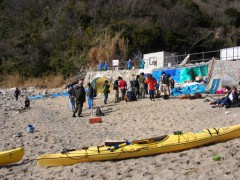
I felt something when I was on the beach. I sympathized, and then prayed to call for the help.
Two weeks later a big earthquake and tsunami occurred in Fukushima. 4 nuke plants were destroyed by the nature and massive radioactives were released to the environment.
Now the construction is halted in Kaminoseki (not yet terminated.) No nuke plants are operated in Japan at present.
In that town, there enshrined the sea dragon.
Was it just an coincident? I just don’t think so. That is why I’ve been feeling fear.
20:06 Posted in Ecology, Japan News, Music, Travel, US-Japan relationship | Permalink | Comments (0) | Tags: military, okinawa, nuclear power
30 April 2014
"Only one person" Lifestyle has become more common in Japan
Recently in Japan one third of households are single person, meaning living alone in one residential unit. Percentage of life-long unmarried people is 25% in male and 15 % in female today. That is 3-4 times increase from 20 years ago.
Businesses respond to that trend. Home electric appliances such as toaster, juice mixer, hot plate targeted to single life people make big sales. Travel agents provide tours for single attendee, which only one person can apply alone. Karaoke room for one singer.
Share house, kind of dormitory style apartments have been built for single households. Since living alone for life is no longer marginalized, such lifestyle is no longer inconvenient one.
Some worry about aging population with low birthrate caused by more unmarried people. Why has such lifestyle become common recently in Japan? You might not believe that since Japan is more traditional and group-oriented society than any other advanced nations.
One of the factors is economy. Japanese economy has gone bad. Especially, among younger generation, income has dropped drastically from their parents' generation.
The other factor is Japan's lack of dating culture like the West. Japan is conservative society so marriages had been commonly arranged by the couples' parents and relatives. That way couples needed no love affairs to reach engagement. Marriage has been considered customary life event among older generations.
Nowadays free choice is important in terms of finding a partner. But not many youngsters do not know how to hunt their appropriate partners because their parents cannot teach them how and culturally such things are not popular so they are not trained to do so. That is a big difference from the West.
Anyway, Japan's population is aging and more people are becoming single-person household. Is it so bad? If so, how should it be amended?
One way to do is lowering life expense. Providing free school education, free medical care, free school meals and financial aids for households with children.
The other is acknowledging diversed lifestyle, not only single-person life but people with children like single-mothers or fathers. Traditional family lifestyle is father-mother and children but nowadays there are many unmarried parents in the world. Like in France more than half of all parents, in US one-third are unmarried. In Japan still only 2%. Japan's system makes single parents hard to deal with society. We have to change that if we are worried about aging population. It is better to help those who want to have children but give up than taking on those who are unreluctant.
Personally, however the population as a whole is aging, it is totally up to individuals to choose what she or he wants to be. No one should tell others what to do.
What do you think about this issue? How is the situation in your country?
20:47 Posted in Japan News, Society | Permalink | Comments (0) | Tags: life
04 March 2014
Very homosocial and divine experience in Fukushima
Not homosexual, homosocial! I joined naked men in thong festival in Hobara town, Date-city, Fukushima Prefecture.
You may feel familiar with Fukushima. Yes, that is in the same prefecture in which that severe nuclear accident occurred after the earthquake and tsunami hit the nuclear plants 3 years ago. Hobara is 50 kilometers away from the Fukushima Daiichi Nuclear Power Plants.
On 2nd of March, I traveled to Fukushima from Tokyo. I brought my gaiger counter (radiation level measure). This was my 5th trip to Fukushima since that disaster. My purpose this time was my third time participation in the festival as naked man in thong walking and running on the street. Other 2 times I joined radiation clean-up mission of the town.
What my gaiger counter indiated at the Tokyo Railway and Fukushima Station were very similar.
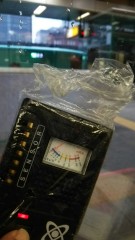
3 years ago, it was different. The below is what I took in Hobara Station July 2011, 4 months after the accident.
As you see, the counter needle went more right. It was over 0.1 Rem. More than 10 times of normal level.
However, it went down but still radiation level is higher than normal.
On that day I went to the gathering place near the Itsukushima Shrine in Hobara town to put on thong.
Over there around 70 men gathered to prepare for the participation. All guys became naked and bathed in hot water tub and after that they got themselves in thongs by local festival staff. Naked guys waiting in a room holding thongs in their hands. Talking about their bodies. Someone joked about that. (See the photos on this Japanese site which were taken 3 years ago) The thong contains cup to hold guys' private thing. After it was tightened by the staff, it was like being chained on your ass to hips. Kind of extra-ordinary feeling.
It is called, Fundoshi or Mawashi in Japanese. Sumo wrestler wear that. In the old days, it was maily used as underwear or swimwear for all the men in Japan.
The festival is named, Tsutsuko-hiki Festival. It literally means pulling the Tsutsuko, divine rice in a big straw bag which weighs 800 kg. To wish for rich harvest and health of the localies. By pulling the bag from all the direction the rice turns out to be soft and sweet rice cake. If you eat that, you can stay healthy all year around.
I learned about this festival when I joined the radiation clean-up mission. Then I decided to join the festival every year to wish for betterment of the town's environment. Only God can change things better, I guess.
After dress-up of the thong guys had to wait for the main event for 1 to 2 hours. Until then other things such as performances or children sports event went on outside.
During that waiting period, guys chatted each other drinking sake (Japanese alchohol beverage) and eating foods in a small room. It is the very men's world. Talking about life, sex and etc. I hesitated to talk about nuclear things because it was too serious for the localies.
Guys were mostly from Fukushima. One young man was from Australia. He said that he now lives in Iwaki-city in Fukushima as translator. He said that he enjoyed wearing Fundoshi. That amazed me. Only one caucasion young man among 70 Japanese men. It was like the short novel I wrote on this blog. A foreign guy experiences very traditional thing which modern Japense do not any longer.
After an hour long talk, I found myself very drank. The main event started and I ran with other guys to the shrine. Guys transported Tsutsuko on the carrier shouting "Wasshoi." After transporting it on main streets of the town, we placed that on the road. Then we, guys pull and bang that on the road shouting.
Later we transported that back to the shrine and the Tsutsuko bag was cut to open. Rice cake in it was divided and handed to participants and gallery. I enjoyed this festival last year and two years ago. However, this time I got too drank to remember what exactly I did.
I just hope things are getting better in Fukushima, Japan and the whole world.
22:17 Posted in Australia, Culture, Ecology, Japan News, Society, Travel | Permalink | Comments (0) | Tags: nuclear power, fukushima, festival






